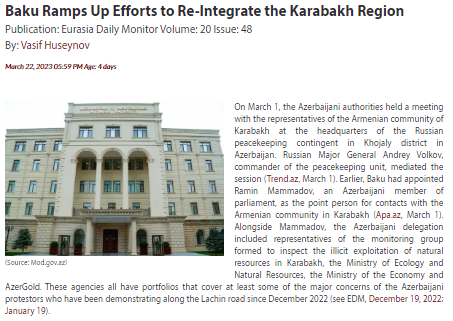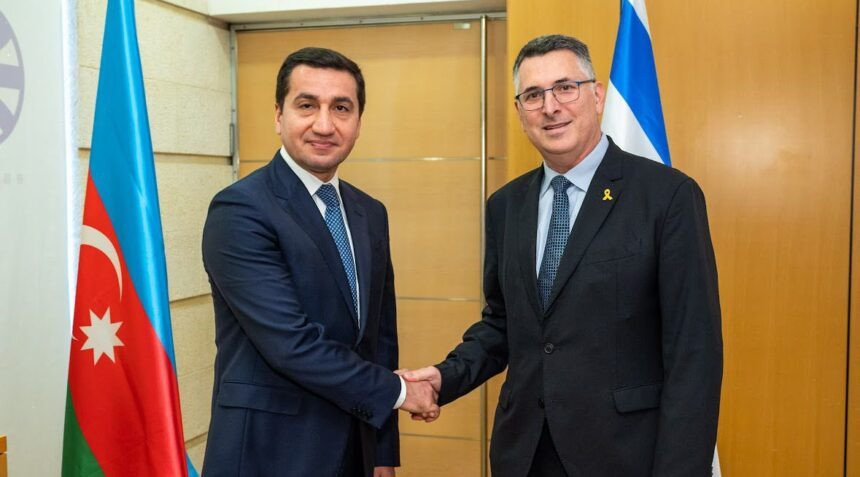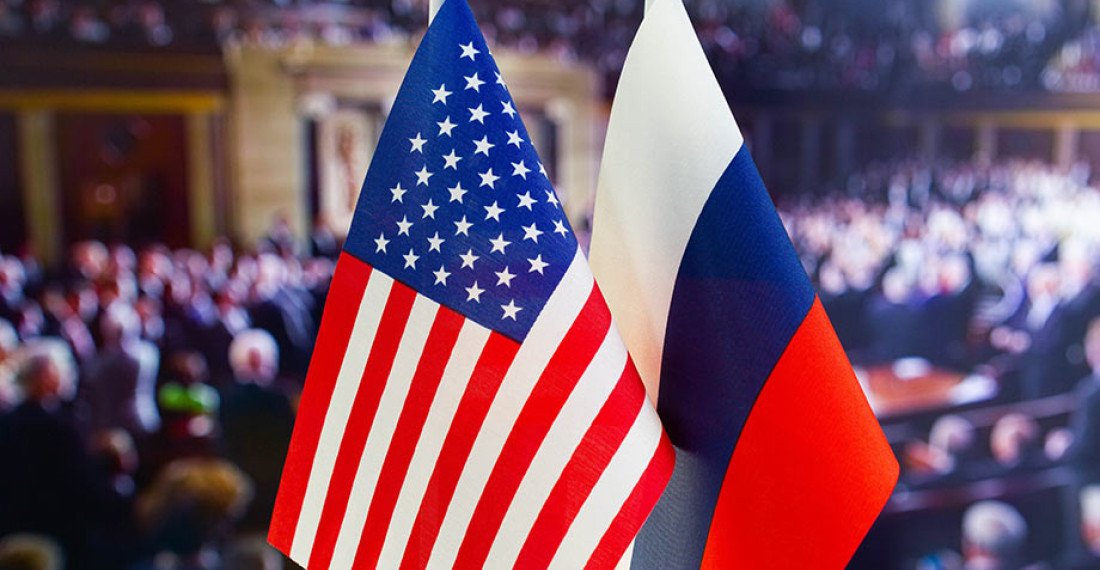On March 1, the Azerbaijani authorities held a meeting with the representatives of the Armenian community of Karabakh at the headquarters of the Russian peacekeeping contingent in Khojaly district in Azerbaijan. Russian Major General Andrey Volkov, commander of the peacekeeping unit, mediated the session (Trend.az, March 1). Earlier, Baku had appointed Ramin Mammadov, an Azerbaijani member of parliament, as the point person for contacts with the Armenian community in Karabakh (Apa.az, March 1). Alongside Mammadov, the Azerbaijani delegation included representatives of the monitoring group formed to inspect the illicit exploitation of natural resources in Karabakh, the Ministry of Ecology and Natural Resources, the Ministry of the Economy and AzerGold. These agencies all have portfolios that cover at least some of the major concerns of the Azerbaijani protestors who have been demonstrating along the Lachin road since December 2022 (see EDM, December 19, 2022; January 19).
The Armenian community’s delegation was headed by Samvel Shahramanyan, secretary of the so-called “security council” of the de facto separatist regime in Karabakh (News.am, March 3). According to Azerbaijani media reports, the sides discussed the reintegration of Armenian residents in the region into the constitutional structure of the Republic of Azerbaijan (Trend.az, March 1). However, this was denied by the Armenian representatives who claimed that the discussion’s agenda was actually based on the following issues: uninterrupted gas and electricity supplies from Armenia to the Karabakh region, a “one-time visual tour” by an Azerbaijani specialized group of the Gizilbulag and Damirli mines and the complete opening of the Lachin road (News.am, March 3).
Earlier contacts were also held between the Azerbaijani authorities and the Armenian community in the Karabakh region, with the mediation of the Russian peacekeepers. Yet, these contacts stalled after the dispatch of Ruben Vardanyan, a Russian oligarch of Armenian origin, to Karabakh. Baku considered Vardanyan to be Moscow’s agent in disrupting the Armenian-Azerbaijani peace process as well as Karabakh’s reintegration into Azerbaijan. As a result, Azerbaijani officials refused to hold any talks with him (see EDM, February 13).
Contacts between the two sides restarted almost immediately after Vardanyan’s dismissal from his position in the de facto separatist Karabakh government. On February 24, one day after his dismissal, representatives of the Armenian community and the Azerbaijani authorities held a meeting, once again with mediation from the Russian side (1lurer.am, February 25). According to the Armenian media, discussions at this time also centered on electricity and gas supplies as well as the opening of the Lachin road (1lurer.am, February 25).
A couple of weeks after the March 1 meeting, the Office of the Azerbaijani President made a public call inviting representatives of the Armenian community to Baku to hold the next round of talks on “reintegration” and “issues related to the implementation of infrastructure projects in Karabakh” (Azernews, March 13). This can be viewed as Baku’s attempt to sideline Russia’s peacekeeping contingent and make a further move toward the peaceful reintegration of the Armenian community in Karabakh.
However, to the likely detriment of the peace process, the representatives of the separatist regime declined the invitation. In response, the Armenian community instead insisted that future negotiations should be held with the mediation of the Russian peacekeeping mission at the same venue as on March 1 (Artsakhpress.am, March 13). Other representative demanded that Baku treat the so-called “Artsakh republic” as an equal partner, seemingly disregarding realities on the ground as well as the internationally supported peace effort (News.am, March 13).
Apart from these, a series of other regional developments have further strained tensions and caused many observers to warn against a possible escalation (see EDM, February 9; Twitter.com/shafiyev_farid, March 14). The first major sign of possible wider escalation happened on March 5 when Azerbaijani armed units detected the transfer of military supplies to the Karabakh region from Armenia using the unpaved Khankendi–Khalfali–Tursusu road (alternative to the Lachin road) (Mod.gov.az, March 5). As a result, small-scale fighting erupted between the parties when the Azerbaijani side attempted to stop and inspect the suspected vehicles. In total, five military servicemen on both sides were killed in the incident.
In the days that followed, the Azerbaijani Defense Ministry released video footage indicating the alleged movement of units from the Armenian Armed Forces along the unpaved road, accompanied by the Russian peacekeeping contingent (Mod.gov.az, March 7, 11). In its statement, the Defense Ministry reminded the Russian peacekeepers about their responsibilities under the trilateral [Russia, Azerbaijan and Armenia] statement of November 10, 2020, and reiterated calls for checkpoints along the Lachin road to better control movement between Armenia and the Karabakh region (see EDM, March 7).
Furthermore, the present situation with negotiations between Baku and Yerevan has not helped the reintegration process of the Karabakh region with Azerbaijan. Baku rejects the involvement of any third party in talks between Baku and the Armenian community of Karabakh as well as the creation of an international mechanism toward this end. These pronouncements have taken a central role in Baku’s position—along with ongoing demands for the establishment of checkpoints in the Lachin Corridor (Report.az, March 12).
In contrast, Armenia’s leadership rejects these proposed checkpoints and vows not to sign a peace treaty with Azerbaijan that does not include provisions regarding the security of the Armenian community in Karabakh. Interestingly, they have not demanded the right of “self-determination” for the Armenians in Karabakh, unlike previous governments (Azatutyun.am, March 10; Azatutyun.am, March 14). Ultimately, this stalemate in negotiations has created a dangerous situation that could end with a military flare-up between the two sides, as has been the case in the past.
In this context, the support of international mediators is crucial in providing a breakthrough. Overall, the European Union has supported Azerbaijan’s concerns about the illegal trafficking of weapons and goods along the Lachin Corridor. EU Special Representative for the South Caucasus Toivo Klaar stated in an interview with Azerbaijani media that “the idea that there should be transparency about what is being transported on the Lachin road is absolutely legitimate,” adding that this road should not be used for any “military or illicit purposes” (Apa.az, March 8).
The EU official, however, did not clarify how such transparency can be provided. Nevertheless, unlike Russian Foreign Minister Sergei Lavrov, Klaar did not exclude the establishment of checkpoints for this purpose (see EDM, March 7). Indeed, the installation of checkpoints would constitute a great leap toward the reintegration of the Karabakh region with Azerbaijan, significantly reduce Russian influence over the region and make a key contribution to the efforts for establishing lasting peace between Baku and Yerevan.
https://jamestown.org/program/baku-ramps-up-efforts-to-re-integrate-the-karabakh-region/








